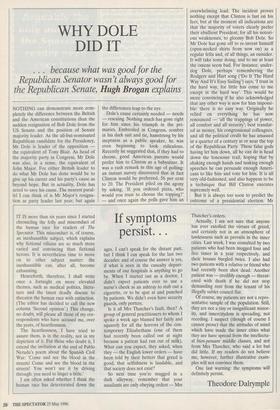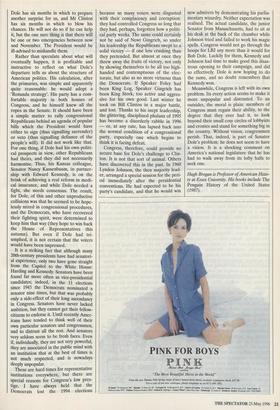WHY DOLE DID IT
. . . because what was good for the Republican Senator wasn't always good for
NOTHING can demonstrate more com- pletely the difference between the British and the American constitutions than the sudden resignation of Bob Dole from the US Senate and the position of Senate majority leader. As the all-but-nominated Republican candidate for the Presidency, Mr Dole is leader of the opposition — the equivalent of Tony Blair. As head of the majority party in Congress, Mr Dole was also, in a sense, the equivalent of John Major. For either British leader to do what Mr Dole has done would be to give up his career and his party's cause as beyond hope. But in actuality, Dole has acted to save his cause. The nearest paral- lel I can think of is Mr Major's resigna- tion as party leader last year; but again the differences leap to the eye.
Dole's cause certainly needed — needs — rescuing. Nothing much has gone right for him since his triumph in the pri- maries. Embroiled in Congress, sombre in his dark suit and tie, hamstrung by his ineptness as a public speaker, he was even beginning to look ridiculous. Recently he suggested that, if they had to choose, good American parents would prefer him to Clinton as a babysitter. It was a rash remark in this age of polling: an instant survey discovered that in fact Clinton would be preferred, 56 per cent to 20. The President piled on the agony by asking, `If you ordered pizza, who would you trust to choose the topping?' — and once again the polls gave him an overwhelming lead. The incident proves nothing except that Clinton is fast on his feet, but at the moment all indications are that the majority of voters clearly prefer their ebullient President, for all his notori- ous weaknesses, to gloomy Bob Dole. So Mr Dole has gone off to re-invent himself (open-necked shirts from now on) as a regular fella and, of all things, an outsider. It will take some doing, and to me at least the omens seem bad. For instance, under- dog Dole, perhaps remembering the Rodgers and Hart song (`Do It The Hard Way And It's Easy Sailing') says, 'I trust in the hard way, for little has come to me except in the hard way'. This would be more convincing if he also acknowledged that any other way is now for him impossi- ble: there is no easy way. Originally he relied on everything he has now renounced — 'all the trappings of power, all comfort and all security'; best translat- ed as money, his congressional colleagues, and all the political credit he has amassed in a quarter of a century at or near the top of the Republican Party. These false gods having let him down, all he can do is head down the lonesome trail, hoping that by shaking enough hands and making enough speeches he can persuade enough Ameri- cans to like him and vote for him. It is all very old-fashioned, and also happens to be a technique that Bill Clinton executes supremely well.
But it is always too soon to predict the outcome of a presidential election. Mr Dole has six months in which to prepare another surprise for us, and Mr Clinton has six months in which to blow his chances. He will not do so if he can help it, but the one sure thing is that there will be one or two emergencies between now and November. The President would be ill-advised to mishandle them.
Rather than speculate about what will eventually happen, it is profitable and instructive to reflect on what Dole's departure tells us about the structure of American politics. His calculation, after the primaries, was simple and apparently quite reasonable: he would adopt a 'Rotunda strategy'. His party has a com- fortable majority in both houses of Congress, and he himself knew all the ropes in the Senate. It should have been a simple matter to rally congressional Republicans behind an agenda of popular bills which the President would have either to sign (thus signalling surrender) or veto (thus signalling defiance of the people's will). It did not work like that. For one thing, if Dole had his own politi- cal prospects in view, other Republicans had theirs, and they did not necessarily harmonise. Thus, his Kansas colleague, Senator Nancy Kassenbaum, in partner- ship with Edward Kennedy, is on the brink of achieving a real reform in medi- cal insurance, and while Dole needed a fight, she needs consensus. The result, for Dole, of this and other unproductive collisions was that he seemed to be hope- lessly mired in congressional procedures, and the Democrats, who have recovered their fighting spirit, were determined to keep him that way (they hope to win back the House of Representatives this autumn). But even if Dole had tri- umphed, it is not certain that the voters would have been impressed.
It is a striking fact that although many 20th-century presidents have had senatori- al experience, only two have gone straight from the Capitol to the White House: Harding and Kennedy. Senators have been found far more often as vice-presidential candidates; indeed, in the 11 elections since 1945 the Democrats nominated a senator nine times, but that was probably only a side-effect of their long ascendancy in Congress. Senators have never lacked ambition, but they cannot get their fellow- citizens to endorse it. Until recently Amer- icans have tended to think well of their own particular senators and congressmen, and to distrust all the rest. And senators very seldom seem to be fresh faces. Even if, individually, they are not very powerful, they are associated in the public mind with an institution that at the best of times is not much respected, and is nowadays deeply unpopular. These are hard times for representative institutions everywhere, but there are Special reasons for Congress's low pres- tige. I have always held that the Democrats lost the 1994 elections because so many voters were disgusted with their complacency and corruption: they had controlled Congress so long that they had, perhaps, forgotten how a politi- cal party works. The same could certainly not be said of Newt Gingrich, so under his leadership the Republicans swept to a solid victory — if one less crushing than they pretended. But almost at once they threw away the fruits of victory, not only by showing themselves to be all too high- handed and contemptuous of the elec- torate, but also as no more virtuous than the Democrats. If Speaker Foley had been King Log, Speaker Gingrich has been King Stork, too active and aggres- sive for his own good. Last winter he took on Bill Clinton in a major battle, and lost. Thanks to his inept leadership, the glittering, disciplined phalanx of 1995 has become a disorderly rabble in 1996 — or, at any rate, has lapsed back into the normal condition of a congressional party, especially one which begins to think it is facing defeat.
Congress, therefore, could provide no secure base for Dole's challenge to Clin- ton. It is not that sort of animal. Others have discovered this in the past. In 1960 Lyndon Johnson, the then majority lead- er, arranged a special session for the peri- od immediately after the presidential conventions. He had expected to be his party's candidate, and that he would win new admirers by demonstrating his parlia- mentary wizardry. Neither expectation was realised. The actual candidate, the junior Senator from Massachusetts, had to sit at his desk at the back of the chamber while Johnson tried and failed to work his magic spells. Congress would not go through the hoops for LBJ any more than it would for Bob Dole. Luckily for them, Kennedy and Johnson had time to make good this disas- trous opening to their campaign, and did so effectively. Dole is now hoping to do the same, and no doubt remembers that Kennedy won.
Meanwhile, Congress is left with its own problem. Its every action seems to make it more unpopular and distrusted. To an outsider, the moral is plain: members of Congress must regain their ability, to the degree that they ever had it, to look beyond their small cosy circles of lobbyists and cronies and stand for something big in the country. Without vision, congressmen perish. That, indeed, is part of Senator Dole's problem: he does not seem to have a vision. It is a shocking comment on America's national legislature that he has had to walk away from its lofty halls to seek one.
Hugh Brogan is Professor of American Histo- ry at Essex University. His books include The Penguin History of the United States (1987).



























































 Previous page
Previous page